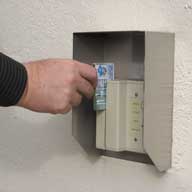ID cards for Delhi citizens trigger intense debate
08 January, 2008
category: Biometrics, Government
The Indian government mandating all citizens in Delhi carry ID cards after January 15th is causing debate over a police state versus security against terrorists. The opposition party (Bhartiya Janata Party, BJP) believes in a national citizen register for use in passports, voting and health care while some in Congress feel it would give the police too much power. At the time of launching the scheme in India in November 2003, the government had stressed that the main propose to issue multipurpose National ID cards is to provide a credible individual identification system for improving the security conditions and to help the e-governance by improving the citizen-government interface.
ID cards for Delhi citizens trigger intense debate
- BJP believes ID cards will help unmask potential terrorists
- Congress and left parties say cards may become a potential for ‘police raj’
NEW DELHI — The government order mandating all citizens living in Indian capital Delhi to carry identity proofs after January 15 lest to invite police action has triggered an intense debate.
Welcoming the decision, the opposition Bhartiya Janata Party (BJP) on Saturday revived its campaign for a national citizen register to have the record of every Indian citizen in the country.
“Delhi governor’s decision for the security purpose is welcome as it would trigger a debate and study of the practical difficulties that may arise from the multiplicity of the ID proofs that the people may have to carry while many may not have any such proof at all,” BJP spokesman Prakash Javadekar told reporters. He said the move initiated in Delhi should be followed up with the issue of the multi-purpose national identity cards (MNIC) across the country and a national citizen register be created to keep record of these cards.
Javadekar said that such cards should be handy to carry in pocket and have all the necessary electronic data on the person on a secure micro processor chip implanted in them to be useful for all purposes including elections and issue of passports and ration cards.
Unmasking terrorists: The BJP believes that the national ID cards will not only help in enhancing national security but they would also help in unmasking potential terrorists and guard against the illegal immigrants.
Police raj: However, leaders in the Congress and the left parties believed that such cards may become a potential for the police raj and harassment of the citizens. Any citizen not having the ID card may be even dubbed Bangladeshi as it used to happen during the NDA regime, a Congress leader pointed out.
Others in the BJP headquarters underlined that the MNIC project was initiated by the NDA government in November 2003 and its importance was also underscored by then President Abdul Kalam in his 2006 Independence Day address to the nation. Though the present UPA government has continued the pilot project launched in selected sub-districts of 12 states and union territory of Puducherry, there appears no urgency to put it on fast track despite acknowledging that the national ID to every Indian citizen would go a long way in increasing the national security.
The prime reason for then deputy prime minister and now opposition leader Lal Krishna Advani to push for these cards was to help in identifying the militants and the Bangladeshis allegedly staying in India illegally. The Delhi governor’s order has enthused the BJP to once again push for such cards as a part of their campaign for increasing the national security.
As part of the pilot project, only last May the first set of the multi-purpose national identity cards were handed over to the citizens of Pooth Khurd in Narela locality of the capital.
The pilot project for collection of the database of citizens and preparation of the smart ID cards is going on in the sub-districts of Rajasthan, Gujarat, Jammu and Kashmir , Andhra Pradesh, Assam, Goa, Tripura, Uttar Pradesh, Uttarakhand, Tamil Nadu, West Bengal and Puducherry. The project involves collection of particulars of the individuals, photographs and finger biometrics of all those who are 18 and above. The national ID cards are prevalent in many countries around the world, including Hong Kong, Malaysia, Singapore, Thailand and some European countries. Some countries, such as Denmark or Sweden, make widespread use of personal identification numbers issued at birth for all official transactions.
A debate continues in the countries like United States and United Kingdom on the merits of adopting national ID cards as they already have the system of the photograph-bearing driving licences for the identification purposes.
At the time of launching the scheme in India in November 2003, the government had stressed that the main propose to issue multipurpose National ID cards is to provide a credible individual identification system for improving the security conditions and to help the e-governance by improving the citizen-government interface.

